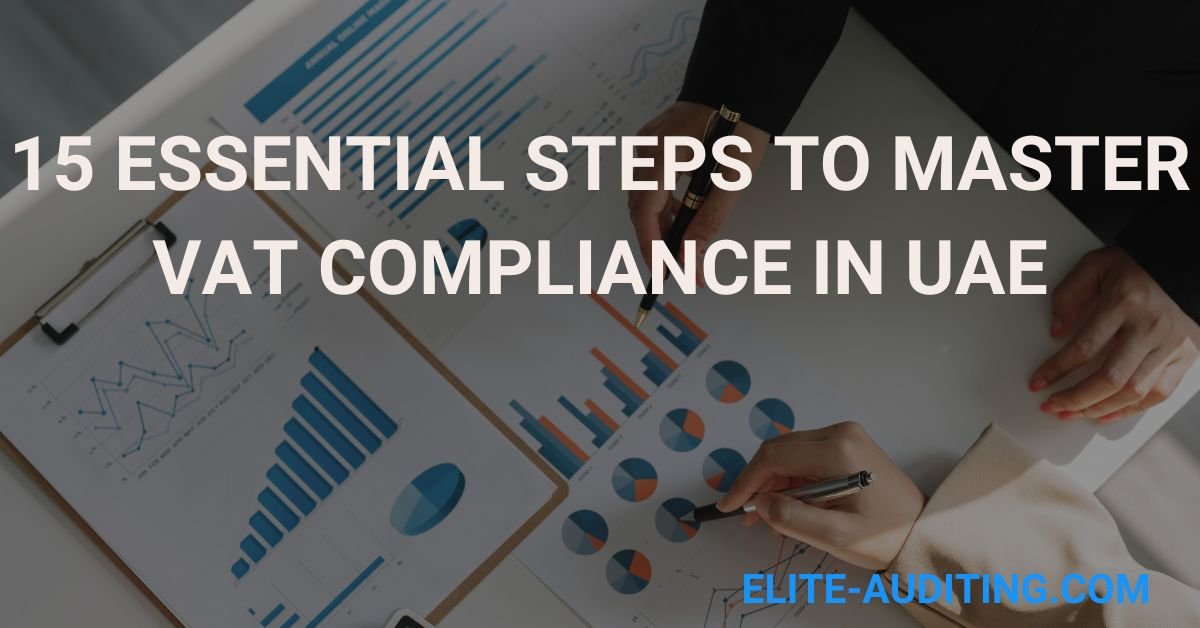15 Essential Steps to Master VAT Compliance in UAE: A Complete Guide 2025
Value Added Tax (VAT) compliance in the UAE is crucial for businesses to operate legally and efficiently in the region’s growing economy. Since its introduction in 2018, VAT has become a fundamental part of doing business in the UAE, requiring careful attention to detail and proper understanding of the regulations.
Understanding VAT Registration Requirements
Who Needs to Register?
- Mandatory registration for businesses with annual turnover exceeding AED 375,000
- Voluntary registration available for businesses with turnover above AED 187,500
- All free zone businesses meeting the threshold
- Non-resident businesses making taxable supplies in the UAE
Registration Process
- Gather required documents
- Trade license
- Bank account details
- Financial statements
- Owner’s passport copy
- Company incorporation documents
- Submit application through FTA portal
- Receive Tax Registration Number (TRN)
- Display TRN on all official documents
VAT Rates and Categories
Standard Rate:
- 5% on most goods and services
Zero-Rated Items:
- Exports
- Educational services
- Healthcare services
- Investment grade precious metals
- Local passenger transport
Exempt Supplies:
- Financial services
- Residential properties
- Bare land
- Local passenger transport
Record Keeping Requirements
Essential Documents to Maintain:
- Tax invoices
- Credit and debit notes
- Import and export records
- Accounting records
- Bank statements
- VAT returns and payment records
Duration:
- All records must be kept for 5 years
- Records related to real estate must be kept for 15 years
Filing VAT Returns
Filing Frequency:
- Monthly: For businesses with annual turnover exceeding AED 150 million
- Quarterly: For businesses with annual turnover below AED 150 million
Filing Process:
- Log into FTA portal
- Enter required details
- Submit supporting documents
- Pay due tax amount
- Keep confirmation receipt
Common Penalties for Non-Compliance
Administrative Penalties:
- Late registration: AED 20,000
- Late filing: AED 1,000 first time, AED 2,000 repeat
- Late payment: 2% immediate, 4% after one week
- Incorrect tax filing: Up to AED 50,000
Best Practices for VAT Compliance
- Regular Internal Audits
- Monthly reconciliation
- Review of tax invoices
- Verification of input and output VAT
- Staff Training
- Regular updates on VAT regulations
- Process documentation
- Clear responsibility allocation
- Technology Implementation
- VAT-compliant accounting software
- Digital record-keeping
- Automated tax calculations
Special Considerations for Free Zone Businesses
- Registration Requirements
- Same threshold applies
- Special procedures for designated zones
- Zero-Rating
- Specific conditions apply
- Documentation requirements
- Inter-Free Zone Transactions
- Special reporting requirements
- Different rules for different free zones
Common VAT Compliance Challenges
- Invoice Requirements
- Correct format
- Required information
- Language requirements
- Time of Supply Rules
- Basic tax point
- Special tax points
- Continuous supplies
- Place of Supply Rules
- Goods vs. services
- B2B vs. B2C
- Special cases
Support and Resources
Available Help:
- FTA Website
- Tax Agents
- Professional Advisors
- FTA Customer Service
Impact of Non-Compliance
Business Consequences:
- Financial penalties
- Trading restrictions
- Reputation damage
- Legal proceedings
- Business license issues
Future Developments
Expected Changes:
- Digital reporting requirements
- Enhanced compliance monitoring
- New technology integration
- Updated penalty framework
Preparing for VAT Audits
Essential Steps:
- Regular internal reviews
- Documentation organization
- Staff preparedness
- Professional support
Frequently Asked Questions
How long does VAT registration take?
Usually 15-20 working days after submitting complete documentation.
Can I voluntarily register if below the threshold?
Yes, if turnover exceeds AED 187,500.
What happens if I miss a filing deadline?
Late filing penalties apply, starting at AED 1,000.
How often must VAT returns be filed?
Monthly or quarterly, depending on turnover.
Can I claim back VAT on all purchases?
Only on purchases related to making taxable supplies.
How Elite Auditing Can Help
Our Services:
- VAT Registration Assistance
- Return Filing Support
- Compliance Reviews
- Audit Preparation
- Staff Training
- Advisory Services
Benefits of Professional VAT Support:
- Reduced risk of errors
- Time and resource savings
- Expert guidance
- Peace of mind
- Updated knowledge
Tips for Successful VAT Compliance
Stay Informed
- Subscribe to FTA updates
- Follow tax news
- Attend workshops
Maintain Systems
- Regular software updates
- Backup procedures
- Security measures
Regular Reviews
- Monthly reconciliations
- Quarterly assessments
- Annual audits
Documentation
- Clear procedures
- Updated records
- Organized filing
Success Metrics for VAT Compliance
- Timely Filings
- Accurate Returns
- Clean Audit Results
- Minimal Queries
- No Penalties
Conclusion
VAT compliance is essential for all businesses operating in the UAE. This guide covers everything from registration to best practices.
VAT compliance isn’t just about avoiding fines. It helps the UAE’s economy grow and builds your business’s good reputation.
As tax rules change in the UAE, it’s important to stay informed. Being proactive helps your business succeed, whether you’re just starting or well-established.
Make sure your business follows all VAT rules and has good systems in place. Professional help is available if you need it, with services tailored to your business needs.
Remember: Good VAT compliance is an investment in your business’s future in the UAE market.
Author






